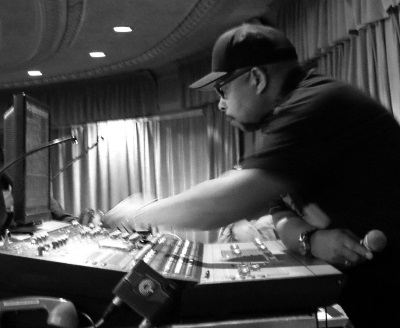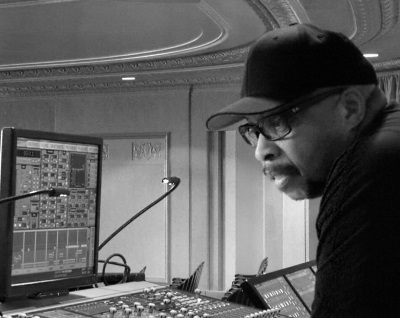
Taking Care
I’m always interested in the issue of trying to stay healthy while on the road for long stretches of tour, so I asked Williams about it. “I can honestly say I love being on the road,” he says. “That’s something I’d never have guessed; at the same time rolling the way we roll can burn you down over time if you’re not careful. The production staff for an artist should be the first ones in and the last ones out. That can mean starting the day with a 4 am lobby call to get to the airport for a 6 am flight and then going straight to the venue and not even seeing your hotel room until 1 or 2 am – then doing it all over again sometimes for three to four days straight before you get a break.
“You have to not overindulge in libations and catch a nap when and where you can. It’s not like it used to be, from some of the stories I’ve heard about bad food and horrible hotel conditions, or at least not with the acts I work with. Erykah Badu and Childish Gambino, another artist I work with, both make sure they have good and varied food options in catering, up to and including vegan meals. Most of the hotels we stay in have gyms and saunas that make it easier to keep healthy, at least when you have time to partake in them.”
Williams shifts his focus to another key concern, especially to those who make their living in sound: “I take care of my ears. I don’t listen to anything at extreme volume levels – ever. Always when I’m on stage setting up mics, I wear my custom-molded attenuators in the case of any ‘accidents.’ When listening to anyone’s mix before my show, I only take out my attenuators to get an idea of what’s going on with the current mix and that takes only a brief amount of time. If it hurts my ears when listening I know it’s hurting/damaging someone else’s, so I don’t hurt my ears when I mix. When I hear an overly “bright” mix, I’m of the mind that the mixer may have something going on with their hearing to make them mix in that fashion.”
Facing Misconceptions
Our attention next turned to the career challenges he’s faced as a person of color. “Racism and preconceived notions permeate every facet of life no matter where you work or on what level,” Williams states. “One time I was mixing a famous white artist with many hits to his credit. At the time I had long dreadlocks and was about 80 pounds skinnier. The artist saw me at FOH and immediately I could see his concern. He spoke to his manager, who came up to me and before he could speak I rattled off a number of (the artist’s) hit songs, and one in particular that was a great song but just an album cut. As luck would have it, that song was one that was near and dear to the artist as he’d written it for his daughter.
“The manager was amazed that I even knew the song and I had to remind him that black people listen to more than R&B, funk, blues or whatever else would be considered ‘black’ music, and that I was capable of mixing what they were doing as I knew his music didn’t require a ‘big bottom’ – to mix it as such would do a disservice to his music and to myself as an engineer,” he adds. “I asked his manager to stand in the middle of the venue and let me know what he thought. He did, they played a tune, and the manager gave the artist and myself the thumbs-up. He then went onstage and told the artist about our conversation and that I was a fan of his music. I saw the artist’s face light up, he smiled and looked back at me, he nodded, as did I in kind to him, and we kept it moving. We had a great performance.”

Williams also has gear preferences, although he’s ready and able to adjust when necessary. “When it’s a tour I’ve certainly got more options than I do with one-offs, but I just ask to know what’s there before I arrive so that I can prepare in advance by having my files ready. I also want to know the sound company and their reputation among my peers.
“The one thing I wouldn’t want to do without are my Waves plugins because of the versatility and options afforded me in a very small package, plus their ability to bring some consistency to what can be a constantly changing audio environment, considering all of the different console choices I’m faced with at one-offs and festivals.
“I really love the Soundcraft Vi6 and Vi3000, but they’re not available everywhere. When I can’t get one, I’ve been on the Avid Profile, which has become what the PM5D was, which is a ‘Chevrolet’ of consoles that you can find almost anywhere. I’ll be taking a DiGiCo SD7 with Waves SoundGrid as well as a Manley VOXBOX and an Avalon 747sp out with Childish Gambino.”
To Do Or Not To Do
As we wrapped up our conversation, I asked Williams what advice he’d give to his younger self as well as to those considering a career in professional audio. “If you don’t really love this, don’t do it,” was his rapid reply. “Do what you’re passionate about. Find yourself before you try to find someone else. I fell into this because of a passion for playing guitar that led to a passion for writing songs that connected me to Norman (Brown) and live mixing. Live mixing became my passion and now I do it full time, while still playing and writing. Be passionate about something and whatever that is do it to the best of your ability. Learn, learn learn – never stop learning.”
He also feels strongly about knowing what gigs not to take, something made very clear to him in talking with Brent Lind, monitor engineer for Childish Gambino. “That stuck with me and I use it to this day. I’ve done gigs where I may have liked the artist’s music, but for one reason or another, it wasn’t the place for me to be so I left – or was left,” he laughs.
“In the past I’ve sometimes felt as if I shouldn’t have left a gig or wondered what I could have done differently to keep it. Sometimes I’ve taken gigs even though I saw warning signs of potential problems. When I had that conversation with Brent what he said laid to rest any thoughts about it.
“I still analyze situations so that when I encounter the same or similar instances, I’m able to handle them better and sometimes that means not taking the gig to begin with. That’s in life as well as mixing. But remember, ‘Everything is not for everybody.’ I only work for artists I like in terms of what they do and how they do it, and then I do my best to bring that to the people who show up to hear them perform.”
